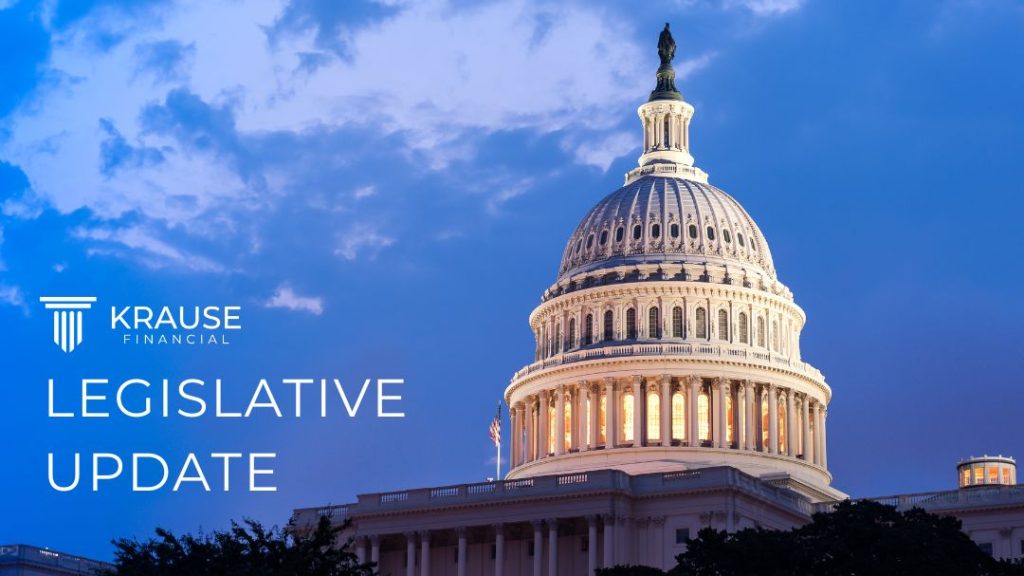Legislative Update: “Big Beautiful Bill” Passes with Some Fireworks

Since we originally posted about the then-pending reconciliation legislation, the Senate version of the President’s “Big Beautiful Bill” passed both chambers of Congress and was signed into law by President Trump. While that tidy sentence makes the BBB’s route through bicameralism and presentment seem straightforward, the reality was anything but. This update is intended to bring you up to speed, peel back the curtain, and highlight some of the fireworks that you may not have seen on the 4th of July.
Bill Passes Senate After Murkowski Bends, Vance Breaks Tie
In our original blog post, we discussed some of the key legislators to keep an eye on as this bill progressed. We made specific mention of Senators Josh Hawley (R-MO), Susan Collins (R-ME), Lisa Murkowski (R-AK), Rand Paul (R-KY), and Ron Johnson (R-WI), each of whom had their own reasons for opposing the bill. These particular legislators were flagged by our Government Relations team as people to watch. As it turns out, they were right on the money.
Senator Josh Hawley adopted a populist tone surrounding the BBB from the outset, particularly as it related to Medicaid cuts for Missourians, many of whom are Medicaid recipients. However, Senator Hawley ultimately flipped his vote to “yes” on the BBB after securing funding for the Radiation Exposure Compensation Act, which provides compensation for individuals impacted by post WWII atomic bomb development exposure; significant processing of radioactive material from the Manhattan project was processed in St. Louis. Notably, Senator Hawley has been tied to suggestions that while he voted for it to become law, Congress will act prior to the effective date of the Medicaid provisions to avoid their impact. Whether that comes to pass, only time will tell.
Senator Ron Johnson of Wisconsin struck a comparably hawkish tone to that of Senator Hawley, focusing instead on the fiscal impacts of the BBB. Senator Johnson raised specific concern over the Bill’s prospective impact on the National Debt. However, despite Senator Johnson’s reservations about the BBB, he received adequate assurances from the Trump Administration to pursue future federal spending cuts that he flipped his vote to “yes.”
Ultimately, three Republican Senators voted in opposition to the BBB. Senator Susan Collins had expressed concern over the BBB’s Medicaid cuts and their impacts on both individuals and the rural healthcare system in Maine—she was unable to get to “yes.” Senator Rand Paul, an espoused libertarian conservative who opposes government intervention and had fiscal concerns with the BBB, loudly denounced the BBB and the impact it would have on the National Debt. Senator Thom Tillis of North Carolina was concerned with the Bill potentially throwing 663,000 of his constituents off of Medicaid and voted “no” while decrying the Bill. Interestingly, Senator Tillis also announced his retirement from Congress after committing to voting “no” on the BBB, making the political calculus that he would not fare well in the primary challenge promised by the President because of Senator Tillis’ opposition.
With all other votes in the Senate along Party lines, the vote was 49-50 with one Republican holdout. The BBB’s viability came down to Senator Lisa Murkowski from Alaska, long known for her independent streak, pragmatism, and willingness to speak truth to her own Party. Senator Murkowski had been making the rounds on various news outlets and in countless interviews explaining the dramatic impact that the BBB would have on Alaskans. She focused significant attention on the unique nature of Alaska given its isolation and the rural nature of its healthcare system. However, while Senator Murkowski was the firmest holdout against the Trump administration on the BBB, she agreed to vote “yes” after receiving a carve out for Alaska’s rural hospitals to the tune of $25 billion, tax deductions for Native Alaskan whalers and fishermen, a delay in SNAP cuts, and extension of certain green energy tax credits. Additionally, our Government Relations team pointed out that Senator Murkowski has a close working relationship with Senate Majority Leader John Thune, having worked together on several difficult pieces of legislation, and that Majority Leader Thune’s cajoling could have contributed to her flip as well. Notably, however, following her “yes” vote, Senator Murkowski went on to say she hoped that the House of Representatives would send the bill back after realizing it is “not there yet.”
With Murskowski voting “yes,” the BBB was tied in the Senate. Vice President Vance, serving as the President of the Senate, was the only person with the Constitutional authority to break the tie. Just after midnight eastern time on July 1, Vice President Vance returned to the Chamber in which he previously served, to cast the tie-breaking vote.
Senate Bill Passes the House
Throughout the Senate’s debate of their version of the BBB, several House members indicated serious objection to the legislation. Many House members even raised issue with their own version of the Bill they passed, with some stating that with last-minute changes they did not fully understand the final version they were voting on. Those House members also indicated the Senate should not send them back a bill that further cuts Medicaid or gets more expensive in terms of the debt and deficit. However, behind the scenes, our Government Relations team felt confident that the President and his negotiators would get a final version on his desk by the self-imposed deadline of July 4th.
The loudest opponent to the Senate’s version in the House of Representatives was Representative Thomas Massie (R-KY). Representative Massie had concerns that the bill would significantly increase deficits, debt, and could negatively impact Americans by causing inflation and high interest rates. Extending further on this fiscal argument, Congressman Massie also warned that the debt increase resulting from the BBB could cause the United States’ credit rating to fall based on concerns over its ability to pay its debt (notably Tweeting “BBB = our credit rating if this bill becomes law”). Massie also criticized the timing of the changes contained in the bill as many of the significant reforms would be delayed until after the mid-terms, raising concern that a new Congress should change those provisions before taking effect.
Representative Massie formed a formidable front in opposition to the Senate Bill amongst House Republicans. Heading into debate, Massie brought his consistent advocacy for limited government spending and intervention. Representative Brian Fitzpatrick of Pennsylvania, a moderate, joined in Representative’s objection to the Bill’s fiscal impact. Representatives Andrew Clyde (R-GA), Keith Self (R-TX), and Victoria Spartz (R-IN) also voiced concerns with the Bill’s spending levels and impact on the debt.
Prior to the Senate Bill being brought to the House floor for a vote on its substance, it had to go through a procedural vote. That vote was held open and extended for 6 hours after time had expired (permissible under House rules) allowing time to negotiate with Republican holdouts that were preventing the Bill from getting a vote. During this time, President Trump was working the phones, personally reaching out to hesitant members and offering assurances. The President’s “Big Beautiful Bill” cleared the procedural hurdle on these assurances and the legislation came to the floor.
Importantly, a political concern throughout this Bill’s formation and debate was President Trump’s self-imposed July 4th deadline for a final version be on his desk for signature. Had the House of Representatives made changes to the Senate Bill, that amended version would have had to been returned to the Senate for approval prior to being sent to the President for signature. Because of the compressed timeline following the procedural holdup, House members were left with little time to work.
On July 3, the House passed the Senate bill as written. The final vote tally was 218 in favor of the Bill’s passage, with 214 votes in opposition. Representatives Massie (KY) and Fitzpatrick (PA) were the only Republicans to join all Democrats in opposing the Bill.
President’s Signature
On July 4, President Trump signed his “Big Beautiful Bill” in an Independence Day ceremony on the South Lawn of the White House. During the ceremony, House Speaker Mike Johnson presented the President with the gavel used during the proceedings; the President then used the gavel to mark the Bill’s enactment following his signature. While the final version passed on the narrowest of margins in the Senate and had to overcome a mutiny in the House of Representatives from his own Party, President Trump’s signature legislation was approved.
Other Notes
While the substance of the Bill is the primary concern for most elder law practitioners (and Americans at large), some of this Bill’s fireworks came in the form of procedure. Here are some other procedural notables worth reading about to fill out the Bill’s context:
- Vote-a-Rama: The “Vote-a-Rama” is a senate procedure employed during budget reconciliation that involves a succession of votes on amendments, allowing for limited debate. The context our Government Relations team provided was that this is a tool typically leveraged by the minority party to force votes on contentious issues. The Vote-A-Rama on President Trump’s “Big Beautiful Bill” lasted over 24 hours and broke numerous senate records. Ultimately, most of the amendments brought by Democrats were voted down, though Chuck Schumer got a “win” by forcing the Parliamentarian to change the formal name of the “One Big Beautiful Bill” to comply with the Byrd Rule preventing consideration of extraneous matters during reconciliation.
- Late night proceedings: This Bill involved notable marathon sessions in each chamber of Congress, with each chamber holding sessions during the overnight hours. In the Senate, the Vote-a-Rama culminated with a final vote in the wee hours of July 1. In the House of representatives, the Rules Committee began a session starting at 1:00 AM, lasting almost a fully 24 hours before the Bill could be brought to the floor. Some opponents of the Bill decried the late-night nature of the proceedings as cutting against a well-informed public and transparency. Republicans countered that given the President’s July 4th deadline, time constraints made waiting for daytime to continue proceedings unworkable.
- Jeffries: House Minority Leader Hakeem Jeffries (D-NY) employed a tactic our Government Relations team indicated was referred to as the “Magic Minute.” This Magic Minute “rule” is more of a custom that allows party leaders (but not all members of the party) to speak for an unlimited time during debate. Jeffries’ Magic Minute actually lasted 524 minutes—8 hours and 44 minutes. While the speech did not prevent the Bill from passing, it did contribute to increased awareness of the Bill’s provisions, forcing the final vote to be carried out during the daytime rather than the early morning hours.

Scott is our Executive Vice President and General Counsel. In addition to staying actively involved in company operations, he further advances our corporate thought leadership efforts, deepens engagement with our partners, and helps shape the strategy that drives our continued growth.



